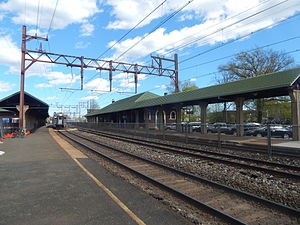Orange station (NJ Transit)
Orange | |||||||||||||||
|---|---|---|---|---|---|---|---|---|---|---|---|---|---|---|---|
 Dover-bound train approaches, in April 2015 | |||||||||||||||
| Owned by | New Jersey Transit | ||||||||||||||
| Platforms | 2 side platforms | ||||||||||||||
| Tracks | 3 | ||||||||||||||
| Connections | |||||||||||||||
| Construction | |||||||||||||||
| Bicycle facilities | Yes | ||||||||||||||
| Other information | |||||||||||||||
| Fare zone | 4[1] | ||||||||||||||
| History | |||||||||||||||
| Opened | November 19, 1836[2] | ||||||||||||||
| Electrified | September 22, 1930[3] | ||||||||||||||
| Passengers | |||||||||||||||
| 2017 | 1,401 (average weekday)[4][5] | ||||||||||||||
| Services | |||||||||||||||
| |||||||||||||||
| |||||||||||||||
Orange Station | |||||||||||||||
U.S. National Register of Historic Places | |||||||||||||||
 The station depot at Orange. | |||||||||||||||
 | |||||||||||||||
| Location | 73 Lincoln Avenue, Orange, New Jersey | ||||||||||||||
| Coordinates | 40°46′18″N 74°14′2″W / 40.77167°N 74.23389°WCoordinates: 40°46′18″N 74°14′2″W / 40.77167°N 74.23389°W | ||||||||||||||
| Area | 4.5 acres (1.8 ha) | ||||||||||||||
| Built | 1918 | ||||||||||||||
| Architect | Nies, F. J. | ||||||||||||||
| Architectural style | Renaissance | ||||||||||||||
| MPS | Operating Passenger Railroad Stations TR | ||||||||||||||
| NRHP reference No. | 84002665[6] | ||||||||||||||
| Added to NRHP | June 22, 1984 | ||||||||||||||
Orange is a New Jersey Transit station in Orange, Essex County, New Jersey, United States, along the Morris & Essex Lines (formerly Erie Lackawanna Railway). Eastbound service is available via the Kearny Connection to Secaucus Junction and Penn Station in Midtown Manhattan and there is also service to Hoboken Terminal.
History[]
The brick station and nearby freight terminal were built in 1918. The station building has been listed in the state and federal registers of historic places since 1984 and is part of the Operating Passenger Railroad Stations Thematic Resource.[7][8]
Station layout[]
Both platforms have walkways over their respective track allowing passengers to access Track 1, though trains on Track 1 do not typically stop at this station.
| Ground/ platform level |
Side platform, doors will open on the right | |
| Track 3 | ← Morristown Line toward Dover or Hackettstown (Highland Avenue) ← Gladstone Branch weekdays toward Gladstone (Highland Avenue) | |
| Track 1 | ← Morristown Line, Gladstone Branch do not stop here → | |
| Track 2 | Morristown Line, Gladstone Branch toward Hoboken or New York (Brick Church) → | |
| Side platform, doors will open on the right | ||
| Street level | Station building, ticket machines, parking | |
See also[]
- List of New Jersey Transit stations
- National Register of Historic Places listings in Essex County, New Jersey
Bibliography[]
- Douglass, A.M. (1912). The Railroad Trainman, Volume 29. Cleveland, Ohio: Brotherhood of Railroad Trainmen. Retrieved April 2, 2020.
References[]
- ^ "Morris and Essex Timetables" (PDF). Newark, New Jersey: New Jersey Transit Rail Operations. November 7, 2010. Retrieved November 27, 2010.
- ^ Douglass 1912, p. 339.
- ^ "Edison Pilots First Electric Train Over Orange-Hoboken Route". The Passaic Daily News. September 22, 1930. p. 5. Retrieved January 31, 2021 – via Newspapers.com.

- ^ "QUARTERLY RIDERSHIP TRENDS ANALYSIS" (PDF). New Jersey Transit. Archived from the original (PDF) on December 27, 2012. Retrieved January 4, 2013.
- ^ "How Many Riders Use NJ Transit's Hoboken Train Station?". Hoboken Patch. Retrieved 2018-07-18.
- ^ "National Register Information System". National Register of Historic Places. National Park Service. March 13, 2009.
- ^ "New Jersey and National Registers of Historic Places". New Jersey Department of Environmental Protection - Historic Preservation Office. Retrieved 7 January 2015.
- ^ Orange New Jersey Transit Railroad Station Survey
External links[]
![]() Media related to Orange (NJT station) at Wikimedia Commons
Media related to Orange (NJT station) at Wikimedia Commons
- Orange, New Jersey
- NJ Transit Rail Operations stations
- Railway stations in Essex County, New Jersey
- Railway stations in the United States opened in 1836
- Railway stations on the National Register of Historic Places in New Jersey
- Former Delaware, Lackawanna and Western Railroad stations
- Renaissance Revival architecture in New Jersey
- National Register of Historic Places in Essex County, New Jersey
- New Jersey railway station stubs
- New Jersey Registered Historic Place stubs


